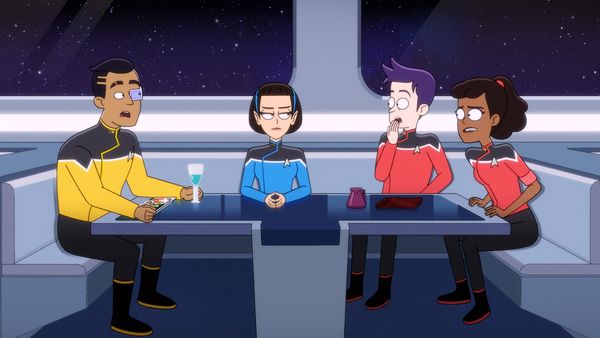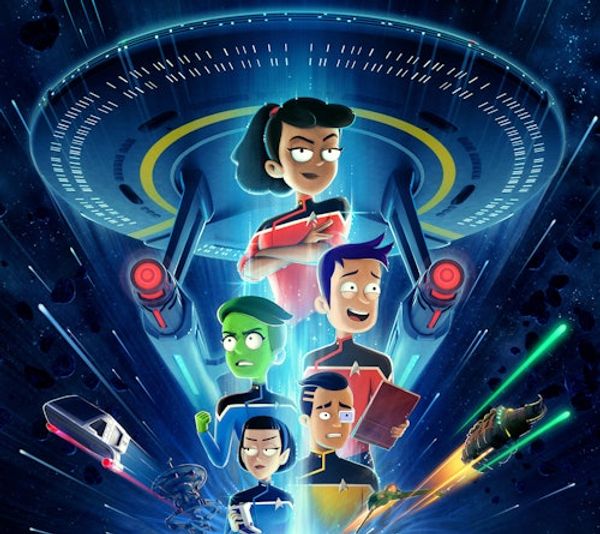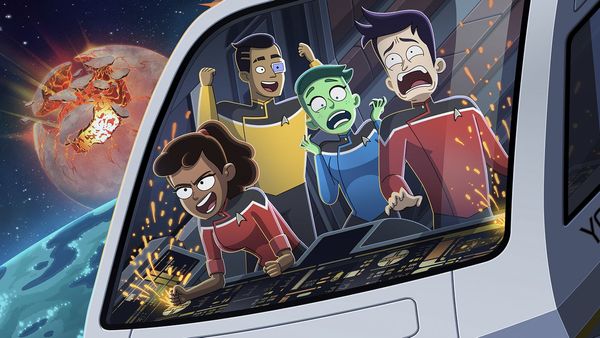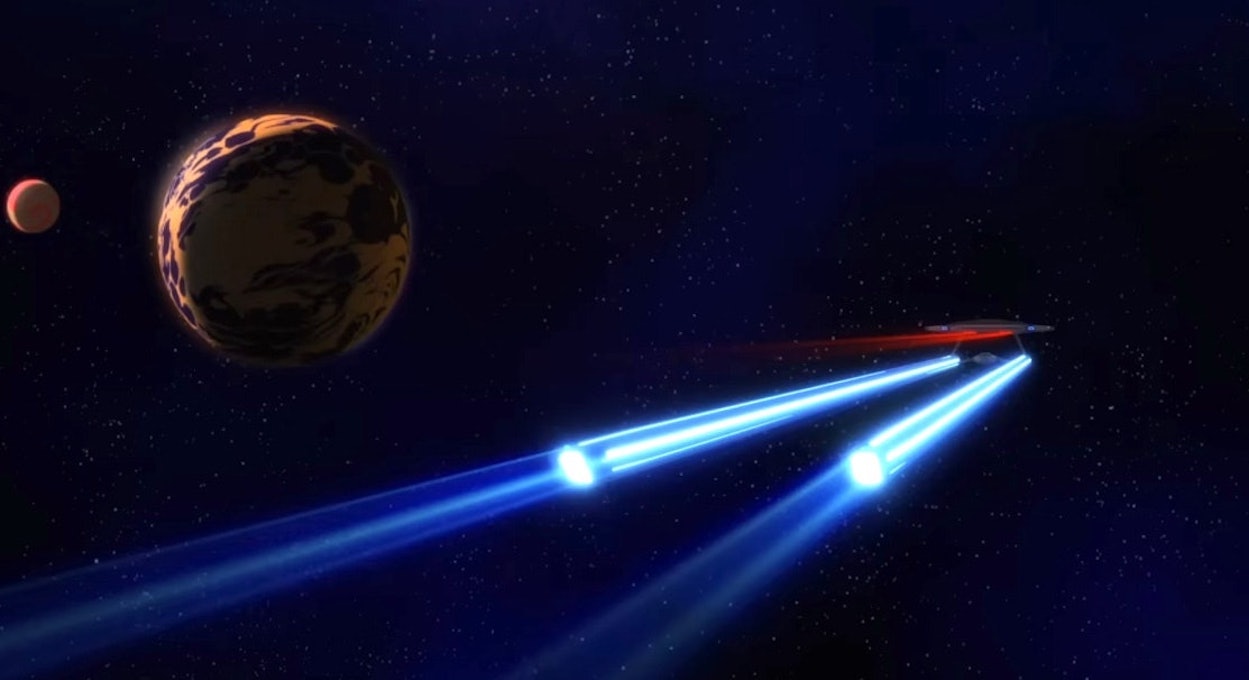
Since 2020, the animated comedy series Star Trek: Lower Decks has been boldly doing something no other Star Trek show has done before: Making fun of itself while also paying loving homage to what came before it. When it debuted between Picard Season 1 and Discovery Season 3, Lower Decks quickly asserted itself as a cheeky throwback. Sporting Next Generation vibes and set at a point in the Trek timeline that reminds everyone of the 1990s, Lower Decks assimilated the core demographic of diehard Trekkies to its cause fairly quickly.
Somewhat uniquely, the entire run of Lower Decks is notable for one specific thing: At no point did the series undergo a radical reinvention or shift in tonal style. Rotten Tomatoes will tell you that Lower Decks got better in Season 2, but the truth is, the show has always been good. And with its fifth and final season dropping October 24 on Paramount+, Lower Decks isn’t going out with a bang or a whimper. It’s simply being itself. The show will have 50 episodes under its belt by the end of this final season, and relatively speaking, these episodes represent the most consistent Star Trek writing of the 21st century.
It would be antithetical to the premise of Lower Decks if its final season was massive and epic. Named after a beloved TNG episode, the entire purpose of this show is to focus on the underdogs of Starfleet, the people cleaning the holodeck, and the ships sent on the less-than-glamourous missions. The greatest enemies across all five seasons of Lower Decks haven’t been huge and iconic like the Borg, but instead silly scavengers, corrupt admirals, or B-list baddies from TNG, like Nick Locarno. Throughout its run, Lower Decks has taken Star Trek’s vague space opera status, pulled out the opera, and inserted a sitcom.
In the first five episodes given to critics for review, Lower Decks Season 5 isn’t doing anything new or flashy, a fact that is as impressive as it is refreshing. While the first episode starts with a very familiar Trek trope — dealing with roads not taken, and the question of which universe is the “true” version of events — the story is firmly grounded in what our characters want and need. Even in the first episode, “Dos Cerritos,” when the crew encounters an alternate version of their ship, the thrust of the story is all about the small decisions the characters make, not a big, epic divergence in the timeline.
While it’s tough to say if this is the best season of Lower Decks, there is a sense of refinement in these episodes, of the show being comfortable with its various formats, character beats, and story structures. For fans hoping for the resolution of Tendi’s (Noël Wells) Orion cliffhanger from Season 4, don’t worry, it will all get sorted out. Like Boimler leaving for the Titan at the end of Season 1, Lower Decks knows that the scrappy main characters — Rutherford (Eugene Cordero), Boimler (Jack Quaid), Mariner (Tawny Newsome), and Tendi (Wells) plus, more recently, T'lyn (Gabrielle Ruiz) — are the core of what makes the show work. The various supporting cast is featured, of course, but if there’s anything this season seems preoccupied with, it’s making sure most of the stories are about our favorite lower-deckers. They’re all lieutenants now, and Boimler is trying out various absurd types of beards, but these are still the same down-to-earth underdogs fans have loved for five seasons. They’re just all a bit happier now.

The larger Star Trek shout-outs and Easter eggs in Lower Decks are perhaps its best-known feature. But what’s interesting in Season 5 is the fact that the show now has enough material to reference itself rather than other, more famous, Star Trek episodes and movies. There’s a great callback to the very first episode of Lower Decks in this Season 5 opener, in which Mariner’s alternate universe doppelganger mocks her with a sarcastic Vulcan salute, it references exactly the way this moment played out between her and her mother in the first episode. “So that’s what that feels like,” Mariner says, calling attention to a moment only diehard viewers will probably notice. Just like in 2020, Lower Decks is not here to explain its jokes. If you know, you know.
And yet arguably not enough casual Star Trek fans do know. As Mike McMahan told Inverse in 2023, “If people want more Lower Decks, they’ve got to tune in and get a couple of other people to tune in...by the time people realize Lower Decks has been canceled, it will be too late.”
That warning has now come to pass, and it’s almost certainly because, unlike Strange New Worlds or Picard Season 3, mainstream crossover for Lower Decks, for whatever reason, didn’t happen. If you go to a Star Trek convention or hang out on Star Trek Twitter, you’ll think Lower Decks is the most popular show, but all versions of Star Trek throughout history have needed both diehard Trekkers and more casual viewers to survive long-term. When first announced in 2019 — arguably at the height of Rick and Morty mania — Lower Decks might have scanned as a cynical ploy on the part of the Trek franchise to colonize adjacent, and possibly, younger, fandoms. And though Lower Decks creator Mike McMahan wrote for Rick and Morty before launching this Star Trek show, the two series couldn’t be any more dissimilar, other than perhaps in general character design and appearance. If anything, when Lower Decks debuted, it was clear that this was the show for old-school fans.
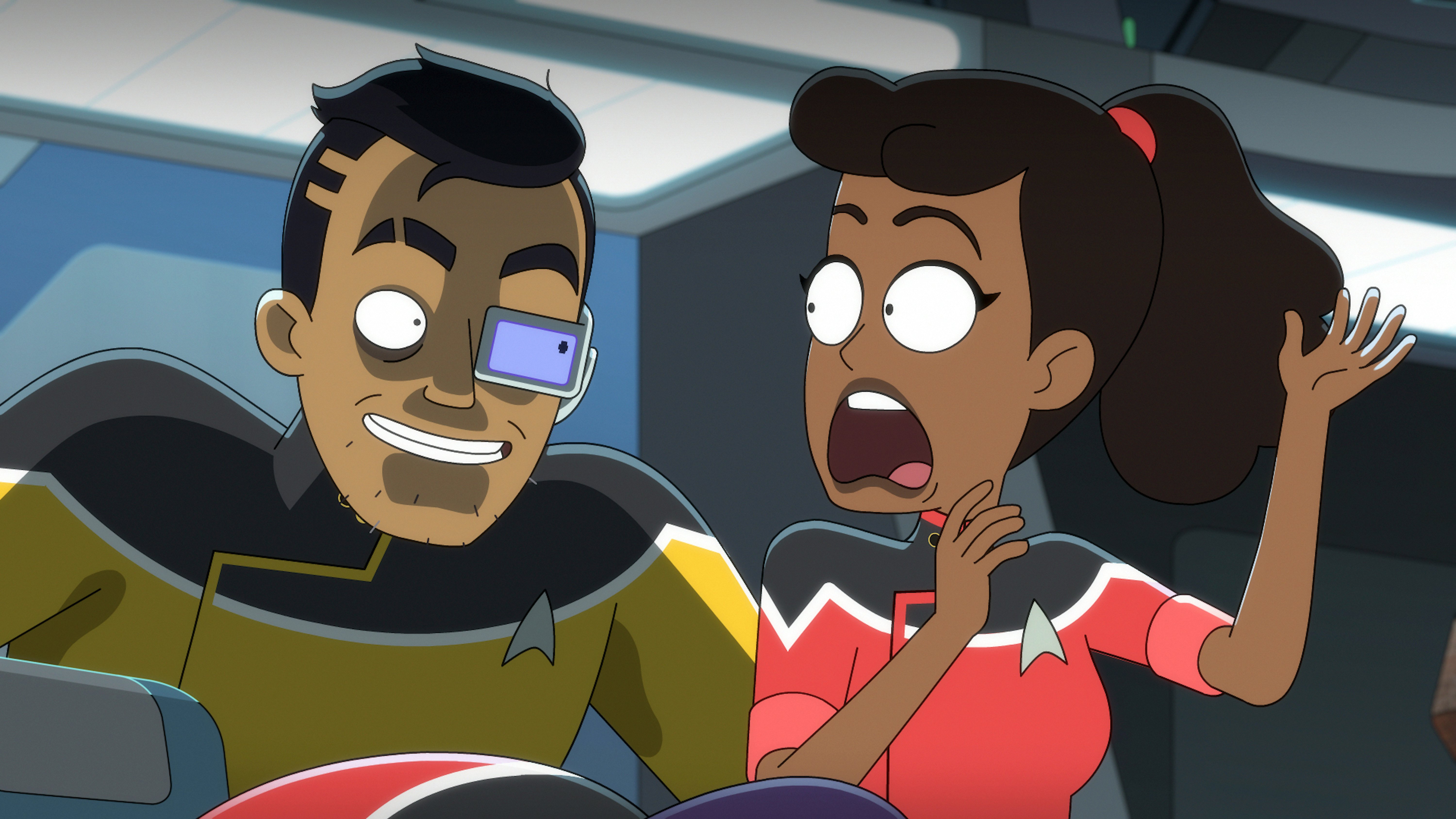
This unapologetic love of all aspects of Star Trek has made Lower Decks paradoxically the most approachable of the new post-2016 Trek shows, but also the most lore-heavy. It’s the Star Trek show of the people and by the people, but also a secret crossover hit waiting for more people in the mainstream to actually watch it.
Ideally, Season 5 is a great moment for Lower Decks to convert casual fans and get them to realize what they’ve been missing since 2020. But what makes this season so great is that it's still confident enough in its own ethos not to pander or try too hard to win over new viewers. The show is cool and knows it's cool. It will be missed when it ends, but, as with all things Trek, it won’t really ever end, at least not in the hearts of fans. Lower Decks wasn’t here for a long time, but it was a very, very good time. It may not have lived as long as it could have, but we all prospered, thanks to its existence. To borrow a phrase from Mariner in Season 4, this show is Star Trek as f*ck, and Season 5 is its victory lap.
Star Trek: Lower Decks Season 5’s two-episode premiere is streaming now on Paramount+. New episodes release Thursdays.
Phasers on Stun!: How the Making — and Remaking — of Star Trek Changed the World
Amazon






